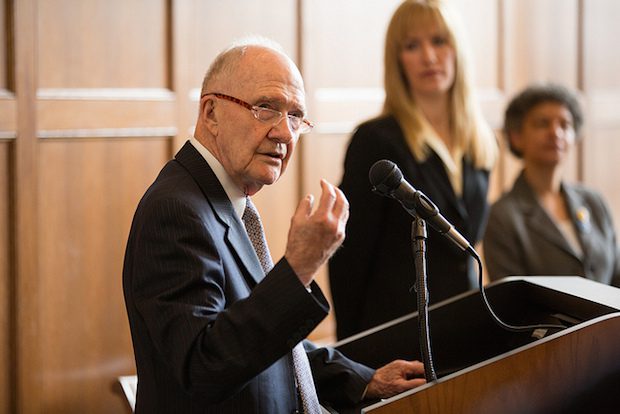Brent Scowcroft: Realist Republican

Near the close of 2003, National Security Advisor Condoleezza Rice was having dinner with her mentor, former National Security Advisor Brent Scowcroft. The war in Iraq was going horribly, contrary to what Rice and other officials in George W. Bush’s administration had planned and promised.
She was eager for welcome developments in the Middle East, and Israeli Prime Minister Ariel Sharon had just announced plans to withdraw the Jewish state’s troops from the Gaza Strip. “At least that’s good news,” Rice said. “That’s terrible news,” Scowcroft told his erstwhile protégé. She asked what he meant. Scowcroft enlightened her: “For Sharon this is not the first move, this is the last move. He’s getting out of Gaza because he can’t sustain eight thousand settlers with half his Army protecting them. Then, when he’s out, he will have an Israel that he can control and a Palestinian state atomized enough that it can’t be a problem.” They had, Scowcroft later told Jeffrey Goldberg of The New Yorker when recounting the dinner, “a terrible fight on that.”
This incident does not find its way into Bartholomew Sparrow’s otherwise exhaustive—and occasionally exhausting—new biography. But it demonstrates the astuteness and capacity for truth-telling that has made Scowcroft among America’s greatest foreign-policy practitioners of the past half-century. About a year after Rice became convinced of Sharon’s sincerity in making peace, his senior advisor Dov Weisglass confided to Ha’aretz the real purpose of the withdrawal from Gaza. “The significance of the disengagement plan is the freezing of the peace process,” Weisglass explained. “It supplies the amount of formaldehyde that is necessary so there will not be a political process with the Palestinians.”
How did Scowcroft instinctively understand the real purposes behind Sharon’s Gaza maneuver? Despite spending significant time studying his subject’s formative years, Sparrow never really establishes the sources of his worldview. Scowcroft was born in Utah in 1925 to Mormon grocers. A childhood interest in the military led him to West Point and then the Army Air Corps. His career as a pilot was cut short in 1949, when a plane he was flying malfunctioned and crashed.
He returned to teach at West Point before becoming an air attaché at the U.S. embassy in Yugoslavia, working under George Kennan. Scowcroft thereafter completed his doctorate but left academia to join the Pentagon as an Air Force Officer. He was soon promoted to military assistant to the president, in which capacity he was appreciated by Richard Nixon and valued by Henry Kissinger. After a year, Scowcroft was elevated to become Kissinger’s second-in-command, and once Kissinger became Gerald Ford’s Secretary of State, Scowcroft took the post of national security advisor himself.
In all these positions, Scowcroft demonstrated competence, loyalty, and emotional intelligence. Even when dealing with difficult personalities such as Nixon and Kissinger, he managed to offer wise counsel and remain esteemed. Sparrow recalls that Scowcroft was often derided as a Yes Man because he was modest, kept disagreements quiet, and refused to play bureaucratic games. Most historians of the period simply ignore him or refer to him as a bland administrator. Sparrow notes that Scowcroft “was a policy implementer and bureaucratic operator—a ‘fixer’—before he became a strategist.” This gave Scowcroft a deep understanding of government process and inculcated him with a profound respect for organizational soundness.
That affinity for process became invaluable when, after working at Kissinger’s consulting firm and serving on several government commissions, he became President George H.W. Bush’s national security advisor in 1989. He performed superbly in that role, by all accounts, helping to manage the demise of the Soviet Union, win the Gulf War, and bring China back from isolation after the Tiananmen Square massacre. Not least, he also handled outsized personalities like Defense Secretary Dick Cheney and Chairman of the Joint Chiefs Colin Powell in a manner that contrasted sharply with Rice’s performance more than a decade later.
Any notion of Scowcroft as merely a bland bureaucrat evaporated instantly with the publication of an op-ed he wrote for the Wall Street Journal in August 2002. Headlined “Don’t Attack Saddam,” the column stated that the Iraqi dictator had nothing to with the 9/11 hijackers, his aims were at odds with the terrorists’, he would never hand over weapons of mass destruction to outside groups, an occupation of Iraq would be bloody and costly for America, and such a war would be a diversion from the war on terrorism.
Read now, Scowcroft’s op-ed is actually notable for its acceptance of some of the Bush administration’s premises. “Saddam’s strategic objective appears to be to dominate the Persian Gulf, to control oil from the region, or both,” it read. “That clearly poses a real threat to key U.S. interests.” We now know, in fact, that Hussein’s primary objective was to defeat internal opposition; to the extent he was concerned with international affairs, his objectives flowed from his domestic insecurity. The column also argued that an attack on Iraq could cause Saddam to use nuclear weapons, which of course didn’t exist.
Nonetheless, considering the feverish atmosphere of mid-2002, the op-ed was wise and an act of considerable courage. Here was a lifelong Republican with close personal and professional ties to President George W. Bush’s father. Scowcroft had worked with Defense Secretary Donald Rumsfeld, was close friends with Cheney and Rice, had strong ties with other administration officials, and had known the president since he was young. He had also helped save the Reagan administration as a member of the Tower Commission investigating the Iran-Contra affair; the commission’s report avoided blaming the president for the scandal in favor of identifying a broken National Security Council as the culprit. 
Now he was publicly broadcasting disagreements with a Republican administration. George W. Bush later wrote in his memoirs that he was “angry Brent had chosen to publish his advice in the newspaper instead of sharing it with me.” It was vintage Bush—clueless and disingenuous. Clueless because Scowcroft had already aired his views that month on CBS’s “Face The Nation,” and his comments had been noticed by Fox News and CNN. Disingenuous because Bush was consciously tuning out Scowcroft and other Iraq War skeptics from his father’s administration. Scowcroft would have much preferred to offer his guidance privately—but as Elliot Abrams admits to Sparrow, he represented to the younger Bush’s team “everything we didn’t like about the George H.W. Bush administration, which was to say we viewed it as weak foreign policy.”
Scowcroft’s column caused as much a furor as an op-ed can. The Strategist ably recalls the vituperative reaction it elicited among hawkish Republicans, who considered Scowcroft a traitor and, in their typical charge, an appeaser. Sparrow interviewed Rice, whose platonic break-up with her mentor is detailed extensively. Though she says she still adores her onetime boss, Scowcroft’s disillusionment with her is apparent. He had been “helpful and useful to her,” he tells Sparrow, suggesting that she was little more than a careerist. Cheney was also interviewed, offering his very Cheney-like opinion that Scowcroft’s “views might be very different if he’d gone through and had to deal with that set of issues we found ourselves having to deal with the morning after 9/11.”
The Strategist also includes original insights from Powell, George H.W. Bush, Kissinger, the late Lawrence Eagleberger, James Baker, George Shultz, Robert Gates, and seemingly everyone else who ever knew Scowcroft. Very few have a negative word to say about him, including hardcore neoconservatives like Abrams and Bill Kristol. The detail is remarkable, and the book serves doubly as a biography and a history of U.S. foreign relations during the Nixon, Ford, and both Bush presidencies.
Sparrow is clearly enamored with his subject, sometimes overstating both his wisdom and rectitude. Scowcroft approved of the bombings of Laos and Cambodia during the Vietnam War, for example, and generally believed in the Domino Theory that predicted Vietnam’s fall would be followed by a collapse in American credibility. The author notes those views, but he never pauses to note their wrongheadedness.
Scowcroft was also a pioneer in the revolving door between government and the private sector that has so corroded American democracy, joining Kissinger and Associates before establishing his own consulting firm, The Scowcroft Group. He represented foreign multinational firms and defense firms in those capacities. Sparrow addresses these clear conflicts of interest by writing lamely, “If anyone could pull of juggling these roles, it would be Scowcroft, with his capacity to wear different hats at the same time, his ability to compartmentalize, and his impeccable integrity.”
Nonetheless, The Strategist should help cement the widespread view that Scowcroft is among the most skilled and successful officials to work in senior U.S. foreign-policymaking in the past half-century. He was the most effective national security advisor since the position was established back in the Eisenhower administration. Especially since 9/11, sober perspectives such as his have been in short supply in Washington in general and the Republican Party in particular.
On an intellectual level, Scowcroft balances a commitment to narrowly defined U.S. interests with a humane viewpoint, a belief in military power with a recognition of its limits. Though those abstract characteristics are possessed others, they seem to exist in just the right proportions in Scowcroft.
An additional lesson conveyed by this book is the underrated value of personal relations. Scowcroft may share some of Kissinger’s perspectives, but he is very far from being Kissinger-like in his bureaucratic dealings. George H.W. Bush’s National Security Council functioned effectively because Scowcroft ensured that every view was fairly heard by the president, who was given a genuine variety of options from which to choose. George W. Bush’s foreign policy failed in no small part because Cheney and Rumsfeld succeeded in marginalizing Powell and the NSC, taking advantage of the president’s lack of curiosity.
With the insurgency in Mesopotamia raging, Condoleezza Rice complained at a dinner party about the war’s course. “No one told me Iraq would be so difficult,” she said. “Yes, they did,” replied Scowcroft, “but you weren’t listening.” The Strategist is convincing in suggesting that, had Rice and others listened to Scowcroft more often, the United States would be much better off.
Jordan Michael Smith is a contributing writer at Salon and the Christian Science Monitor.
Comments